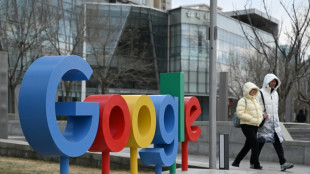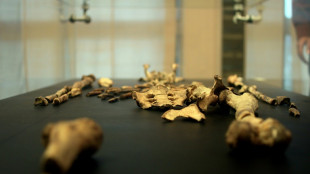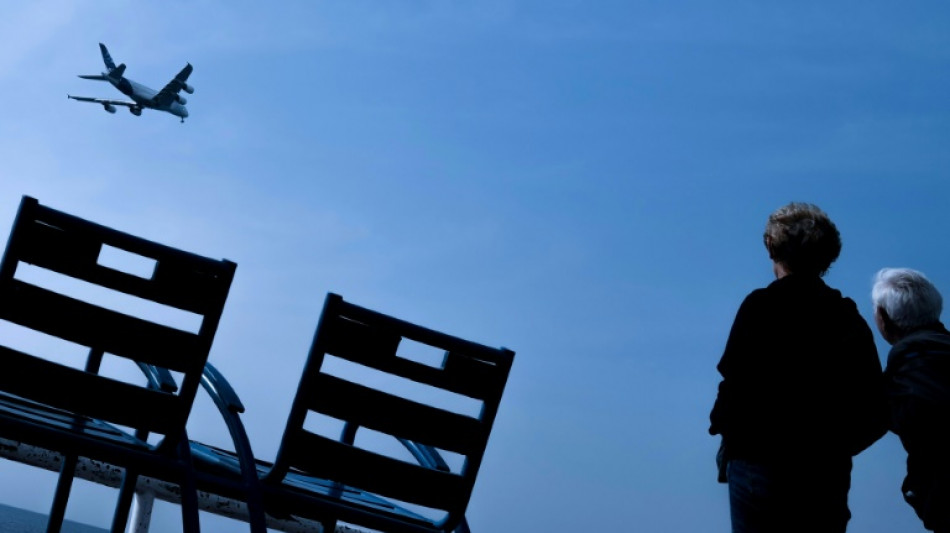
-
 Hermoso pressured to downplay kiss, brother tells Spain court
Hermoso pressured to downplay kiss, brother tells Spain court
-
MotoGP champion Martin breaks hand and foot in Malaysia crash

-
 US trade gap swells in 2024 as deficits under fresh scrutiny
US trade gap swells in 2024 as deficits under fresh scrutiny
-
Aga Khan: five things about the prince of sport

-
 Rubio sees Guatemala leader keen to please US
Rubio sees Guatemala leader keen to please US
-
Swedish king leads mourning after school massacre

-
 US Postal Service halts China suspension after stoking trade fear
US Postal Service halts China suspension after stoking trade fear
-
Steel decline sparks protests and a movie in Belgium

-
 Root 'crucial' for England ahead of Champions Trophy, says skipper
Root 'crucial' for England ahead of Champions Trophy, says skipper
-
Chelsea star Kerr 'feared for my life' during taxi ride

-
 India's Rohit insists struggles 'nothing new' ahead of England ODIs
India's Rohit insists struggles 'nothing new' ahead of England ODIs
-
Even in career twilight, Ronaldo's star undimmed at 40

-
 Barca avoiding 'excuses' after Real Madrid ref complaints: Flick
Barca avoiding 'excuses' after Real Madrid ref complaints: Flick
-
Australia fear rank turner for second Sri Lanka Test

-
 EU seeks new import fee on e-commerce packages
EU seeks new import fee on e-commerce packages
-
Oscars frontrunner 'Emilia Perez' suffers awards season crash

-
 Swedish police say school killing spree gunman likely shot himself
Swedish police say school killing spree gunman likely shot himself
-
Stocks, dollar drop as tariff tensions intensify

-
 Oil giants TotalEnergies, Equinor reduce low-carbon investments
Oil giants TotalEnergies, Equinor reduce low-carbon investments
-
Kremlin calls Zelensky's readiness for Putin talks 'empty words'

-
 Trump bid to take over Gaza, move Palestinians faces backlash
Trump bid to take over Gaza, move Palestinians faces backlash
-
Liverpool's Slot not a fan of in-stadium VAR announcements

-
 Stiff competition awaits as Vonn hunts gold in world super-G
Stiff competition awaits as Vonn hunts gold in world super-G
-
Pakistan health workers kick off polio drive despite snow
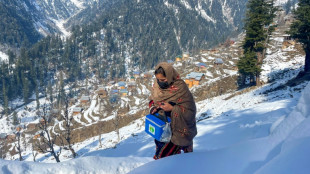
-
 Austria's Puchner tops second downhill training at world champs
Austria's Puchner tops second downhill training at world champs
-
Bid to sell Suu Kyi's Myanmar mansion flops for third time

-
 Aga Khan: racehorse billionaire and Islamic spiritual leader
Aga Khan: racehorse billionaire and Islamic spiritual leader
-
China slams US 'suppression' as trade war deepens

-
 Sri Lanka's Karunaratne to bow out of Tests after 'fulfilling dream'
Sri Lanka's Karunaratne to bow out of Tests after 'fulfilling dream'
-
Philippine House votes to impeach VP Sara Duterte

-
 Tokyo police bust alleged prostitution ring targeting tourists
Tokyo police bust alleged prostitution ring targeting tourists
-
Baltics to cut Soviet-era ties to Russian power grid

-
 Iraq's famed 'hunchback' of Mosul rebuilt brick by brick
Iraq's famed 'hunchback' of Mosul rebuilt brick by brick
-
Stock markets stutter as traders weigh China-US trade flare-up

-
 Hamas rejects Trump proposal to take over Gaza, move Palestinians
Hamas rejects Trump proposal to take over Gaza, move Palestinians
-
MotoGP champion Martin taken to hospital after Malaysia crash

-
 YouTubers causing monkeys to attack tourists at Cambodia's Angkor Wat
YouTubers causing monkeys to attack tourists at Cambodia's Angkor Wat
-
Sweden reels from worst mass shooting in its history

-
 India's Modi takes ritual dip at Hindu mega-festival
India's Modi takes ritual dip at Hindu mega-festival
-
Nissan shares fall as reports say Honda merger talks off

-
 US Postal Service says suspending parcels from China
US Postal Service says suspending parcels from China
-
Toyota announces Lexus EV plant in Shanghai

-
 Santander reports record profit for third straight year
Santander reports record profit for third straight year
-
No new clothes: S. Korean climate activist targets hyperconsumption
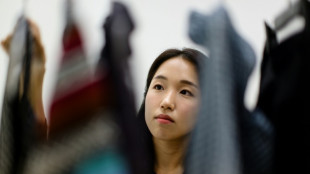
-
 Cummins 'hugely unlikely' for Australia's Champions Trophy bid
Cummins 'hugely unlikely' for Australia's Champions Trophy bid
-
Nissan shares plunge as report says Honda merger talks off

-
 China holds out hope last-minute deal can avert US trade war
China holds out hope last-minute deal can avert US trade war
-
LeBron relishing 'special' Doncic double act

-
 Tatum shines as Celtics down Cavs, Lakers thrash Clippers
Tatum shines as Celtics down Cavs, Lakers thrash Clippers
-
Myanmar junta bid to sell Suu Kyi mansion flops for third time


Fly less? Go vegan? How people can take climate action
Individuals along with economy-wide efficiencies can make a major difference in the drive to avert the worst of global warming, UN climate experts say, estimating that sharp cuts to demand for energy-guzzling services could slash emissions up to 70 percent by 2050.
Avoiding airplanes, eating less meat, insulating your home could all make a dent, particularly when broad swathes of societies embrace change, says the United Nations Intergovernmental Panel on Climate Change.
While research often focuses on cutting emissions in the supply of goods and services -- energy generation, transport, agriculture, construction -- the IPCC has for the first time dedicated a whole chapter of its climate solutions report to the demand that drives these industries.
"Having the right policies, infrastructure and technology in place to enable changes to our lifestyles and behaviours can result in a 40-70 percent reduction in greenhouse gas emissions by 2050," said Priyadarshi Shukla co-chair of IPCC working group that produced the 3,000 page report.
But where can "this untapped potential", as Shukla calls it, be found?
- Day-to-day choices -
"Avoid, shift, improve" -- these are the key ways to curb demand, the report says.
You can avoid energy-intensive behaviour, switch to low-carbon technologies and improve the efficiency of existing tech.
In general, there are plenty of opportunities for improvement in the ways people travel from point A to point B.
You can change an internal combustion engine car to an electric one ("improve"), or even "shift" your daily commute to cycling or walking.
The biggest potential for avoidance is reducing long-haul flights. If people took fewer long distance flights and took the train where possible, overall aviation emissions could be reduced by 10 to 40 percent by 2040.
Meanwhile, increasing energy efficiency in homes and other buildings takes first place in the "improve" category.
And the most important "shift" you can make is to adopt a plant-based diet. But becoming a vegetarian or even vegan would have less of an emissions impact than cutting out one long-haul flight a year.
The report also highlights the need to reduce all types of waste, from energy or food for example.
"Choosing low-carbon options, such as car-free living, plant-based diets without or very little animal products, low-carbon sources of electricity and heating at home as well as local holiday plans," can reduce an individual's carbon footprint by up to nine tonnes of CO2 equivalent, says the IPCC.
- Unequal -
Most people in the world never take long-haul flights in the first place and do not have access to nutritious food.
Billions of people have a carbon footprint far below nine tonnes of CO2 equivalent.
For example, the average carbon footprint per inhabitant in Afghanistan is less than one tonne, according to the report, while in most western developed nations it is well over 10 tonnes.
And within countries there can also be an enormous split between the lavish energy consumption of the rich and the meagre carbon footprint of poorer people.
In fact, about half of the world's emissions can be attributed to the consumption of the richest 10 percent of the global population, the report said.
At the bottom of the wealth pyramid, the poorest half of the world contributes around 10 percent of consumption emissions.
"Wealthy individuals contribute disproportionately to higher emissions and have a high potential for emissions reductions while maintaining decent living standards and well-being," the report said.
- Beyond behaviour -
The responsibility for transforming the world's energy use and economic system to deal with climate change cannot be borne on the shoulders of individuals alone, the report stresses.
While people can make a difference with their lifestyle choices, the IPCC says transformative change involves more than just individuals' consumption choices.
There also need to be shifts in culture and social norms, business investment, political drivers from institutions, and changes in infrastructure.
T.Bondarenko--BTB

